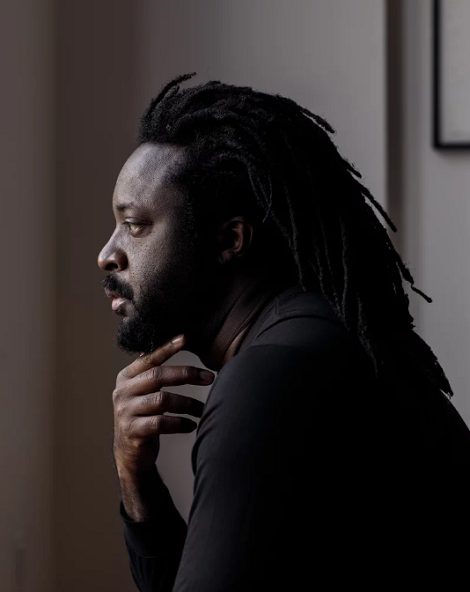
Kudos and more kudos to Marlon James! Here is the latest article—by Lucy Feldman for Time magazine—on the Jamaican writer’s trajectory and his new epic novel Black Leopard, Red Wolf.
A little over three years ago, Marlon James made a comment he now insists was a joke. The acclaimed Jamaican author, fresh from winning the Man Booker Prize for his novel A Brief History of Seven Killings, told a reporter that his next project would be an “African Game of Thrones.” James underestimated the buzz the comparison would stir up, and soon enough, multiple outlets published breathless stories about the diverse epic fantasy he had promised. Now, on the eve of that novel’s release, James laughs when he considers just how far his offhand comment traveled: an email arrived in his inbox from George R.R. Martin, the man behind the massively popular fantasy series. Sitting at his office desk in Brooklyn, dressed in a black one-piece tracksuit, James sets down his yogurt and pulls up the message: “‘I was flattered by the mention,’” James reads aloud, his deep voice rasping into a chuckle. “‘I think it’s a project well worth doing. I look forward to reading it one of these days.’”
It turns out that James’ new epic, Black Leopard, Red Wolf, which hits shelves today and kicks off a trilogy, does resemble Martin’s series, in a few key ways: each features warring royals, deadly beasts and plenty of graphic sex scenes and bloody battles. James says he even “cheated” — his word — and studied how Martin crafts violent sequences with mythical creatures.
But James’ book is set in a distant-past Africa and filled with queer characters of color inspired by the continent’s history and mythology. And it joins the ranks of those by authors like Tomi Adeyemi and N.K. Jemisin, whose works push back against stereotypes about the types of figures who “should” appear in fantasy fiction. There’s no Jon Snow in the world James created: “I wasn’t trying to write some noble warrior walking through the bush,” he says. Tracker, the protagonist, is a man whose sense of smell reveals the whereabouts and recent deeds of those he encounters. He’s deeply flawed—brash, violent and distrustful of love — and brings those qualities with him as joins a crew set on finding a mysterious missing child.
The novel challenges the notion that there are lines to be drawn between literature and genre fiction. Some British publishers rejected the book, saying it’s “too sci-fi for the literary crowd and too literary for the sci-fi crowd,” a judgment that James wholeheartedly disdains. “The idea that somebody who reads, say, Octavia Butler can’t read Toni Morrison is absolutely ludicrous,” he says.
And a writer can channel them both in a single work. Breaking down those boundaries has helped James thrive: Black Leopard is his first book since A Brief History, his fictionalization of a real 1976 assassination attempt on Bob -Marley—which he saw as an experiment with another genre, crime fiction—took home one of literature’s most prestigious prizes and became a paperback best seller. James’ Booker win, the first by a Jamaican author, catapulted him to literary stardom.
At 620 pages, Black Leopard is an ambitious undertaking, even for readers used to Martin’s dense prose and meandering storytelling. James himself acknowledges that his books can be challenging. A Brief History had more than 70 characters, and many spoke in Jamaican patois. His new novel has more than 80 and often leaves the reader with half a thought to carry through pages and pages before finally uniting it with its other half. “I take a lot of risks,” James says. “When I throw the reader into the deep end, I just have this faith they’re going to find their way back.”
The next two books in the Dark Star Trilogy will tell the same story from other perspectives. The second, which he’s currently plotting, will follow a witch from the first book. Who tells the third, James gleefully declares, is a secret. At the end of the trilogy, the reader will have to decide which narrator, if any, is telling the truth—a nod to the African storytelling tradition wherein tricksters’ stories must be taken with a grain of salt. “Seeing sometimes doesn’t depend on the object,” James says. “It depends on the eyes.” [. . .]
For full article, see http://time.com/5521259/marlon-james-black-leopard-red-wolf-book/?
[Photo above: Ike Edeani for TIME.]
